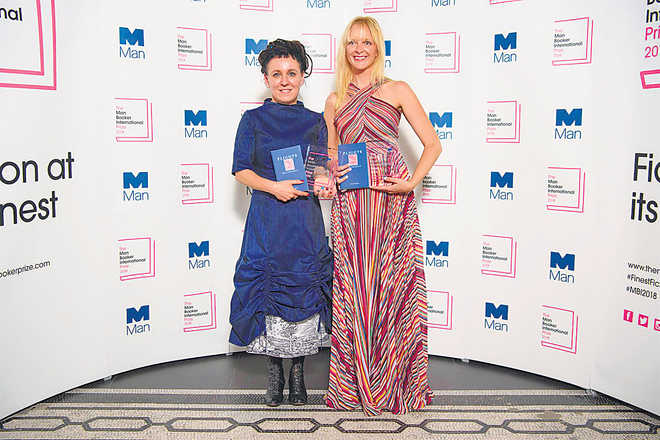
Maiden reward: Olga Tokarczuk is the first Polish writer to win the Man Booker International prize
Olga Tokarczuk recently won the Man Booker International prize, the best work of translated fiction from anywhere in the world. Tokarczuk is the first Polish writer to win the coveted prize. In an earlier interview, Tokarczuk and translator Jennifer Croft speak about Tokarczuk's 'constellation' strategy which brings together lots of different voices into relationships with one another via the lines the reader draws between them.
How do you feel?
Olga: It's been incredible. Just the worldwide reach and power of the Man Booker International Prize has astounded me. Flights is a novel I wrote over ten years ago, so I do have some distance from it (I've written three other books since then), and I, sometimes, have to go over it again now to refresh my memory, but in fact — to my great astonishment — I find this process to be a pleasant one, and I even find I wouldn't change much about the novel if I had it to do over.
The science of preserving bodies is a theme in your novel. How did your preoccupation with this start?
It is one important theme, yes. It's always amazed me how little we know about our bodies. How we could travel to distant lands or even go to the moon and yet have no idea what our own livers look like. Our bodies are still mysteries. Yet these are the fragile vehicles in which we make the journeys of our lives.
I've also long been fascinated by how people ever came to learn about the body to begin with, and by the development of the study of anatomy. That field really sort of exploded in Holland in the seventeenth century. As I was writing Flights, I happened to be spending some time there, and I took full advantage of the local museums and libraries. Back then I was most affected by the art of preserving human tissues, which I saw as a metaphor for humanity's eternal yearning for immortality.
What has it been like?
Jennifer: It has been unbelievably gratifying to see Olga's work begin to reach the worldwide readership it so richly deserves. I fell in love with Olga's writing around 15 years ago and have been working ever since to get her books published in English, with a lot of help from Olga's other translator into English and even longer-standing advocate, Antonia Lloyd-Jones. Flights is an ambitious novel with a quirky (and if you ask me, thrilling) form. And even though many readers find this form appealing, publishers in the US and the UK were extremely reluctant to take a chance on Flights. It took ten years from the Polish date of publication for it to come out in English. We're so thankful to Jacques Testard at Fitzcarraldo Editions for having the courage and the vision to make this happen at last.
What did you most like about translating Flights?
For this novel, Olga uses a strategy she calls 'constellation,' which partly means bringing lots of different ideas and stories and voices into relationships with one another via the lines the reader draws between them. I love translating all of Olga's writing because of her surgical precision in dealing with the psychologies of her characters and her nuanced and lyrical prose, and the fact that without ever being heavy-handed, she always manages to be crystal clear and profoundly effective. Flights was also delightful because I was able to tap into a fresh subject every time I sat down at my computer. One minute I was worrying about the woman who flies back to Poland from New Zealand to kill a dying childhood friend; the next I was amused by foibles of the internet; the next I was rethinking my own approach to travel, or to my body. I could go on and on. I love translating Olga.
An excerpt from Flights
The Tongue is the Strongest Muscle
- There are countries out there where people speak English. But not like us-we have our own languages hidden in our carry-on luggage, in our cosmetics bags, only ever using English when we travel, and then only in foreign countries, to foreign people. It's hard to imagine, but English is their real language! Oftentimes their only language. They don't have anything to fall back on or to turn to in moments of doubt.
- How lost they must feel in the world, where all instructions, all the lyrics of all the stupidest possible songs, all the menus, all the excruciating pamphlets and brochures-even the elevator buttons!-are in their private language. They may be understood by anyone at any moment, whenever they open their mouths. They must have to write things down in special codes. Wherever they are, people have unlimited access to them-they are accessible to everyone and everything! I heard there are plans in the works to get them some little language of their own, one of those dead ones no one else is using anyway, just so that for once they can have something just for themselves.
— This is part of a series of Man Booker International Prize 2018 longlist interviews



























